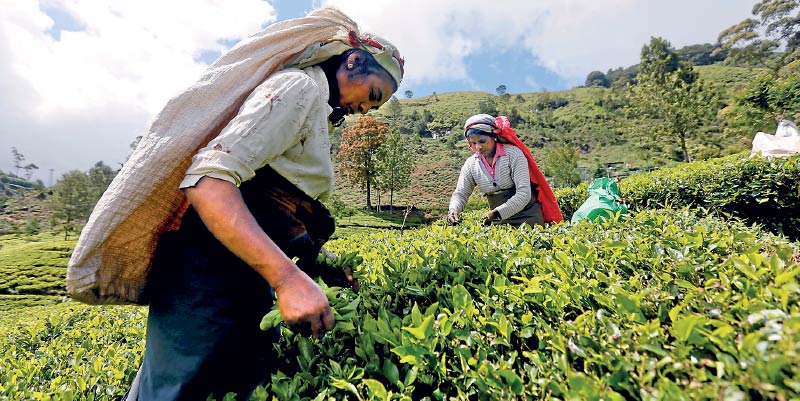Wednesday Feb 18, 2026
Wednesday Feb 18, 2026
Tuesday, 18 November 2025 01:21 - - {{hitsCtrl.values.hits}}

Paying your workers less than a decent wage is not a “burden”. It’s a responsibility
 The data forecloses any possibility of plantation companies facing financial bankruptcy. But the arguments they choose to advance lay bare a deeper moral bankruptcy. This moral bankruptcy manifests in many ways. It fuels plantation companies’ rapacious pursuit of profit over the weathered backs of workers. This moral bankruptcy incessantly exploits workers, while delegitimising and dismissing workers’ demands for a decent wage
The data forecloses any possibility of plantation companies facing financial bankruptcy. But the arguments they choose to advance lay bare a deeper moral bankruptcy. This moral bankruptcy manifests in many ways. It fuels plantation companies’ rapacious pursuit of profit over the weathered backs of workers. This moral bankruptcy incessantly exploits workers, while delegitimising and dismissing workers’ demands for a decent wage
 And so it begins. Familiar murmurs. Rote grumblings.
And so it begins. Familiar murmurs. Rote grumblings.
In 2021, we suffered the Regional Plantation Companies’ (RPC) and Planters’ Association of Ceylon’s (PAC) familiar whining, when workers agitated to increase the minimum daily wage to Rs. 1,000. We listened to their tiresome litany of complaints again in 2024 when attempts were made to increase the minimum wage to Rs. 1,350. On both occasions the RPC and PAC declared that increasing wages would make Sri Lankan tea uncompetitive on the global market. On both occasions they told us that plantation companies were on the verge of collapse and that a wage increase would push them over the precipice to bankruptcy. On both occasions they warned us that increasing wages would end
Sri Lanka’s tea industry.
Despite their fear mongering, plantation companies’ own data confirm that the wage increases in 2021 and 2024 have not driven them to bankruptcy. In fact, companies continued to make profits after these wage hikes. For example, in the financial year 2021 – 2022, after an increase to the minimum daily wage in the tea industry from Rs. 750 to Rs. 1,000 on
1 March 2021, Talawakelle Tea Estates PLC profits increased to Rs. 819,970,000. This was a 13.9% increase in profits compared to the previous financial year. Maskeliya Plantations PLC profits increased to Rs. 162,622,000, 57.1% higher than the previous year. Even after the Government increased the minimum wage to Rs. 1,350 on 12 August 2024 plantation companies continued to post healthy profits. Again, for example, Talawakelle Tea Estates PLC reported profits of Rs. 1,231,000,000. Although down by 24.6% compared to the previous year, it still boasted a profit margin of 15.97%. Maskeliya Plantations PLC reported profits of Rs. 958,372,000, a mind-boggling increase of 104.7% compared to the previous year. It seems that palm-readers at Galle Face are more likely to foretell our futures accurately than “experts” in the tea industry are likely to correctly predict the impact of wage increases on the tea industry.
Fortunately, tea plantation prophets compensate for their inability to predict the future with their sheer persistence in getting it wrong. In October this year when the President announced an intention to increase the basic wage in the tea sector to Rs. 1,700, the familiar grumblings began. Soon after this, on 15 October, an article was published in the Daily Mirror: “New plantation sector wage hike plan lacks economic logic: PA”, airing plantation pundits’ well-rehearsed apocalyptic prophesying about the impact of wage increases on the tea industry. History strongly suggests that the dire predictions in this article are unlikely to materialise and that companies are unlikely to change their tune. Even though to respond to these arguments would likely be to flog dead horse, some dead horses must be flogged. And so, I flog.
“In 2022, when the daily wage was Rs. 1,000, a kilo of tea was sold at Rs. 1,093. Now the daily wage is Rs. 1,350 and we are getting Rs.1,083.”
The choice to begin the narrative from 2022 is both intentional and political, and wilfully misleads the reader. Beginning in 2022 paints plantation companies as magnanimous employers who increased wages between 2022 and 2024 even though the average price of tea did not increase. It also frames the demand for increasing wages as unreasonable. But, if we begin in 2021, a far more incriminating picture of employers emerges. With the precipitous depreciation of the Sri Lankan rupee during the 2022 economic crisis, the average price of high grown tea increased by a staggering 86.2% from Rs. 587 in 2021 to Rs. 1,093 in 2022. However, wages were not increased by even a rupee, remaining fixed at Rs. 1,000 from 2021 to 2024. During this period, companies profited prodigiously and actively opposed sharing any profit with workers. This longer story reveals that it is in fact employers who have acted unreasonably by opposing wage increases, and that the demand for higher wages is both reasonable and necessary.
“If we give an increase of a further Rs. 350 within one year, we would be giving a 70 percent wage increase…”
Here again, we encounter a similar convenient starting point for the narrative, i.e., one year ago. Again, the assertion characterises plantation companies as victims of a cruel Government illogically advocating for an increase of wages. However, looking a little further back in time exposes how intentionally misleading this argument is.
On the one hand, the average price of tea increased by 86.2% in 2022 and remains steady at that price today. On the other hand, the cost of living for workers also doubled during the same time period. Even as corporate revenue went through the roof, workers struggled to feed themselves and their families. It was in this context that the tea industry unconscionably opposed increasing daily wages for more than two years, until August 2024. Today, plantation companies whine about increasing wages by 70% within a year when they have been profiting for three years from an 86.2% increase in the average price of tea. Looking back past 2024 to 2021, the proposal to increase wages by 70% is certainly unreasonable. It is unreasonable, not because it is too much, but because it is too little too late. Far too little. Far too late.
 The Government must rethink this proposal, and require plantation companies to take responsibility for paying workers a decent minimum wage which affords them a life of dignity. The Government and plantation companies can and ought to do better
The Government must rethink this proposal, and require plantation companies to take responsibility for paying workers a decent minimum wage which affords them a life of dignity. The Government and plantation companies can and ought to do better
“The move has no firm economic logic and would saddle the sector with an additional Rs. 13 billion burden per year.”
Firstly, paying your workers less than a decent wage is not a “burden.” It’s a responsibility. Secondly, this “Rs. 13 billion burden per year” comment puts a figure on just how much workers were underpaid since 2022. It suggests that by paying a daily wage of Rs. 1,350 rather than Rs. 1,7000 in 2025, plantation companies stole Rs. 13 billion from workers. It also suggests that when plantation companies paid Rs. 350 less, at Rs. 1,000 a day between 2022 and 2024, they stole twice as much each year. By refusing to increase wages beyond Rs. 1,000 between 2022 and 2024, they stole Rs. 26 billion annually. Since 2022, by their own admission, plantation companies have cumulatively stolen Rs. 65 billion by underpaying workers. Recast in this light, it is not the “burden” of paying an extra Rs. 350 a day that is unreasonable. Rather it is the vulgar profits plantation companies have made over the last three years by underpaying their workers that is unreasonable.
The data forecloses any possibility of plantation companies facing financial bankruptcy. But the arguments they choose to advance lay bare a deeper moral bankruptcy. This moral bankruptcy manifests in many ways. It fuels plantation companies’ rapacious pursuit of profit over the weathered backs of workers. This moral bankruptcy incessantly exploits workers, while delegitimising and dismissing workers’ demands for a decent wage. It also blinds industry leaders to the unreasonableness of their own decisions and actions, and breeds contempt towards those who disagree with them. More than responding to individual arguments, it is this moral bankruptcy underwriting those arguments which must be confronted.
Unfortunately, the Government has demonstrated no stomach for such a task. In his Budget speech the President Anura Kumara Dissanayake promised to increase daily wages in the tea plantation to Rs. 1,550 and to pay a further Rs. 200 as a budgetary allowance. This move is nothing more than a capitulation to industry demands and a subsidising of greed. It only deepens the moral bankruptcy. The Government must rethink this proposal, and require plantation companies to take responsibility for paying workers a decent minimum wage which affords them a life of dignity.
The Government and plantation companies can and ought to do better.
(The author is an Attorney-at-Law specialising in fundamental rights law and an anthropologist, trained at the Australian National University, with extensive experience conducting social research in Sri Lanka.)